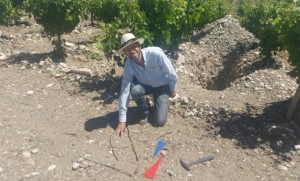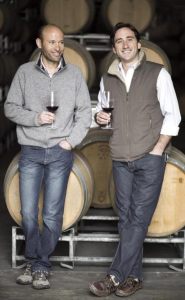Today we have a conference preview from Nora Z. Favelukes, president of QW Wine Experts. Nora tells us about a “Terroir in Focus” research program based at the Doña Paula Winery in Mendoza, Argentina, and gives us a preview of a presentation entitled “Uco Valley: Terroir in Focus.”
It’s the Soil that Makes the Difference: Doña Paula Winey, located in Argentina’s Mendoza province, is the test area for a unique study: the Terroir-in-Focus Research Program. This program is dedicated to better understanding the influence of the climate and soils on Malbec. Wine Expert Nora Z. Favelukes visited with Martin Kaiser and Marcos Fernandez, Doña Paula’s Head Viticulturist and Winemaker, and gathered the following enlightening insights.
An Estate with Multiple Conditions: Founded in 1997, Doña Paula rapidly became one of Argentina’s leading producers and exporters of estate-bottled wines. Grapes are sourced from their 1,700 acres of vineyards planted in Luján de Cuyo and Uco Valley—Mendoza’s premier wine regions—at altitudes ranging from 3,280 to 4,400 feet above sea level. These vineyards experience diverse weather conditions and have a great variety of soils—from deep clay loam to alluvial.
Limestone is Key: For the past eleven years, Martin Kaiser has devoted a great deal of his time conducting extensive research throughout Argentina’s terroirs: “While traveling, from the northern to the southern wine regions, I assessed the impact of the diverse climate and soils on each grape variety”, Kaiser narrates briefly. Back at Doña Paula, he piloted a study of over 1,000 pits that showed that limestone is quite common in the region but the effect of its presence is only relevant in cool climate regions (such as the highest areas of Uco Valley) where the fruit shows more ripened flavors when compared with grapes grown in soils with less limestone. Martin adds “Once we identified plots with high content of limestone, we harvested and vinified the grapes separately. I was surprised how limestone positively affects the quality of wines!”

Martin Kaiser explaining—with twigs and flags—the effect of climate and altitude at the highest point of the Alluvia Vineyard in Gualtallary
Each Malbec is Different: Chief Winemaker, Marcos Fernandez explains that in the past three years he has conducted over 300 micro-vinifications with his team to better understand the impact of the soil on the wines. “The best micro-vinifications were the ones with grapes sourced from calcium carbonate (limestone) and rocky soils. These grapes produced intense wines, with great minerality and sharp tannins” Marcos added, “Our Malbec fruit has enhanced ripened flavors compared with soils with less limestone. Each of our vineyards gives a distinctive aromatic footprint to the Malbec.”
Martin Kaiser and Marcos Fernandez will present their session, “Uco Valley—Terroir in Focus: An In-Depth look at its diverse soils” on Friday, August 11th at 10:30 am as part of SWE’s 41st Annual Conference, to be held in Portland, Oregon. Martin and Marcos will share with us their findings while doing a comparative tasting of Uco Valley Malbec samples: same vintage, identical vineyard management and vinification techniques. What is the difference? The soils!
